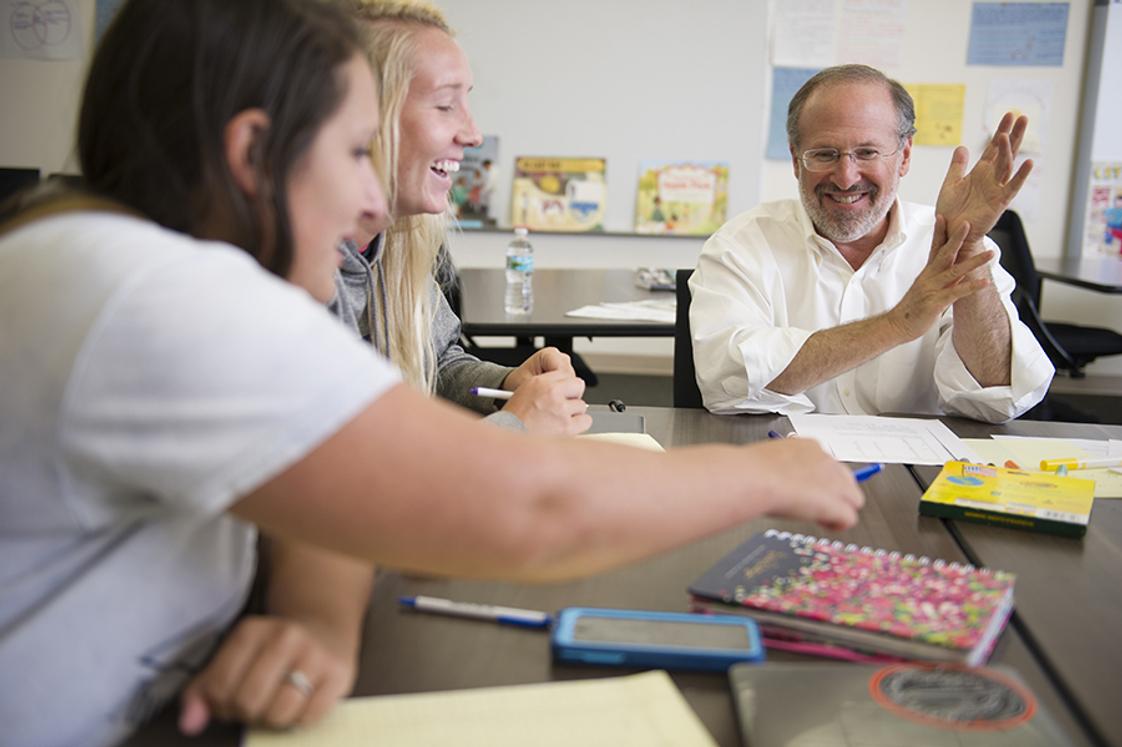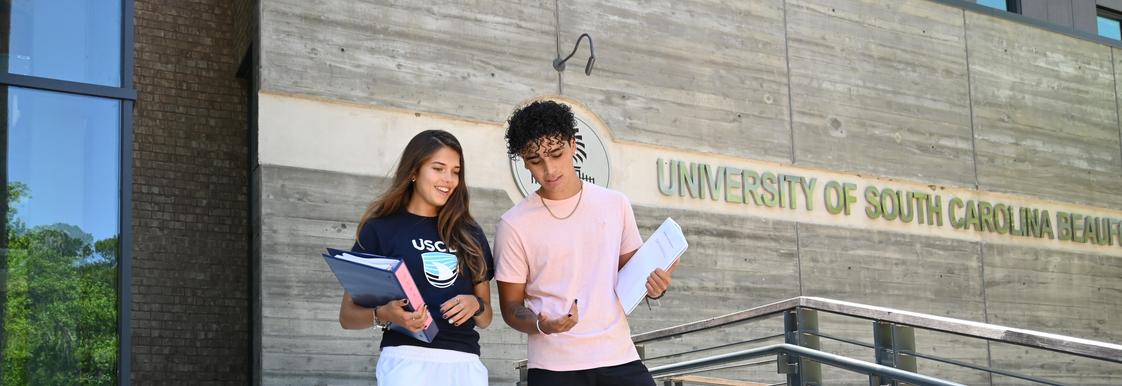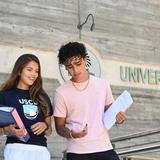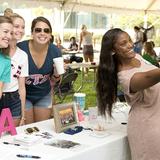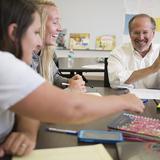- The University of South Carolina Beaufort (USCB) is a small, public university in a beautiful, coastal setting with over 2,000 students from around the globe. USCB has a diverse and vibrant academic community serving the South Carolina Lowcountry and beyond. USCB offers students activities and programs for you to immerse yourself in, fostering a sense of culture and belonging. This includes campus-wide programming, fraternity and sorority life, and many other student organizations.
School Highlights
University of South Carolina Beaufort serves 2,531 students (72% of students are full-time).
The college's student-teacher ratio of 31:1 is higher than the state community college average of 18:1.
Minority enrollment is 39% of the student body (majority Black), which is less than the state average of 48%.
Quick Facts (2026)
- Enrollment: 2,531 students
- In-state tuition: $21,360
- Out-state tuition: $32,406
- Acceptance Rate: 84%
- Student-teacher ratio: 31:1
- Minority enrollment: 39%
- Source: Verified school update
School Overview
The teacher population of 82 teachers has stayed relatively flat over five years.
University of South Carolina Beaufort
(SC) Community College Avg.
Carnegie Classification
Baccalaureate Colleges: Diverse Fields
Associate's Colleges: High Vocational & Technical-High Traditional
Institution Level
Four or more years
At least 2 but less than 4 years
Institution Control
Public
Public
Total Faculty
82 staff
177 staff
Student Body
The student population of University of South Carolina Beaufort has grown by 26% over five years.
The student-teacher ratio of 31:1 has increased from 22:1 over five years.
The University of South Carolina Beaufort diversity score of 0.58 is less than the state average of 0.63. The school's diversity has grown by 6% over five years.
Total Enrollment
2,531 students
1,971 students
Student-Teacher Ratio
31:1
18:1
# Full-Time Students
1,811 students
622 students
# Part-Time Students
720 students
1,349 students
# Enrollment Undergraduate
244 students
279 students
# Full-Time Undergraduate Students
1,803 students
605 students
# Full-Time Graduate Students
8 students
8 students
# Part-Time Undergraduate Students
642 students
1,965 students
# Part-Time Graduate Students
78 students
32 students
Total Dormitory Capacity
1,061 students
260 students
% American Indian/Alaskan
n/a
n/a
% Asian
1%
2%
% Hispanic
10%
9%
% Black
19%
29%
% White
61%
52%
% Hawaiian
n/a
n/a
% Two or more races
5%
4%
% Non Resident races
2%
n/a
% Unknown races
1%
4%
Diversity Score
0.58
0.63
College Completion Rate (Students who graduate in less than 4 years)
n/a
26%
College Completion Rate (Students who graduate in 4 years or more than 4 years)
38%
17%
Average Graduate Earnings (10 Years)
$33,900
$28,800
Tuition and Acceptance Rate
The public in-state tuition of $21,360 is more than the state average of $5,692. The in-state tuition has grown by 99% over four years.
The public out-state tuition of $32,406 is more than the state average of $10,568. The out-state tuition has grown by 48% over four years.
In-State Tuition Fees
$21,360
$5,692
Out-State Tuition Fees
$32,406
$10,568
Tuition Notes
*Tuition and fee rates are approved by the University of South Carolina Board of Trustees, and are estimated for full-time enrollment (12-16 credit hours). Tuition and fees are subject to change without notice. Estimate does not include the cost for books and supplies, and other miscellaneous fees that are course-specific, such as science lab fees, art course fees, and nursing fees.
% Students Receiving Some Financial Aid
93%
93%
Median Debt for Graduates
$25,000
$11,729
Median Debt for Dropouts
$8,250
$5,500
Acceptance Rate
84%
88%
SAT Reading
525
470
SAT Math
500
455
SAT Writing
n/a
413
ACT Composite
20
17
ACT English
19
16
ACT Math
19
17
ACT Writing
n/a
6
Sports
Total Sports Offered
6 sports
Sports
BaseballCross Country
GolfSoccer
SoftballTrack and Field
Source: 2024 (or latest year available) Integrated Postsecondary Education Data System (IPEDS) , School Administrators
School Notes
- In 1959 another act of the South Carolina legislature created the Beaufort campus of the University of South Carolina on the original Beaufort College site on the banks of the Beaufort River to offer USC courses. In 1994 International Paper gave eighty acres of land to build an additional full-service campus of USC Beaufort in the region's highest growth area. County government agreed to finance the construction of the campus if the University were designated as a four-year university. Once state approvals for four-year status were completed, construction of the South Campus began. In June 2002, USCB was granted four-year status by the South Carolina Commission on Higher Education, and in 2004 USCB was accredited as a Level II baccalaureate degree granting university. Classes at the South Campus began in August 2004. The state's newest four-year university, USC Beaufort offers baccalaureate degrees, access to USC's Extended Graduate Campus classes and degrees and numerous continuing education programs at its two full-service campuses. USCB offers programs in mathematics and the natural sciences, humanities, and professional and social sciences. Its curriculum is designed to promote acquisition of knowledge and, through it, the intellectual dispositions and skills that encourage depth of understanding, tolerance of others and individual accountability. Attracting a racially and culturally diverse student body of varying ages and experiences, the University of South Carolina Beaufort draws its students primarily from the South Carolina Lowcountry, with representation from other parts of the state, other states, and foreign countries. The University encourages students to think analytically and abstractly, to explore options, to see similarities, to be open to differences, to communicate effectively, and to respect each individual. In addition to offering bacculaurete degrees, the University of South Carolina Beaufort offers Associate of Arts and Associate of Science degrees to Military Personnel at the Marine Corps Air Station and Parris Island Recruit Depot. USCB also partners with the Extended Graduate Campus of theUniversity of South Carolina to make graduate education available to citizens of the Lowcountry.
Frequently Asked Questions
How much does University of South Carolina Beaufort cost?
University of South Carolina Beaufort's tuition is approximately $21,360 for In-State students and $32,406 for Out-State students.
What is the acceptance rate of University of South Carolina Beaufort?
The acceptance rate of University of South Carolina Beaufort is 84%, which is lower than the state average of 88%.
What sports does University of South Carolina Beaufort offer?
University of South Carolina Beaufort offers 6 interscholastic sports: Baseball, Cross Country, Golf, Soccer, Softball and Track and Field.
School Calendar
View the University of South Carolina Beaufort yearly calendar below. Note key dates such as:
Event
Date
1st Half Spring Term (2A) - Last day to drop/withdraw without grade of 'WF' being recorded
February 26, 2026 (Thursday)
1st Half Spring Term (2A) - Last Day of Class
March 02, 2026 (Monday)
Spring Break (no classes)
March 09, 2026 (Monday)
Spring Break (no classes)
March 10, 2026 (Tuesday)
Spring Break (no classes)
March 11, 2026 (Wednesday)
Recent Articles

Community College vs. Bootcamps for Tech Careers in 2026
Community college vs. bootcamps in 2026. Compare cost, outcomes, credentials, and hiring trends to choose the best tech career path.

How to Build a Class Schedule That Fits Your Life (Spring 2026)
Learn how to build a class schedule that fits your life with expert tips, updated strategies for Spring 2026, and practical planning tools for students and families.

Top 10 Jobs for Community College Graduates in 2026
Meta Description: Discover high-demand jobs for community college graduates, with current salary trends, costs, and career pathways.

